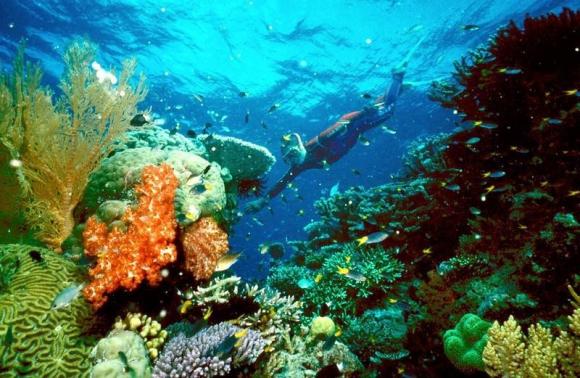Australia makes strides in cleaning up Great Barrier Reef - U.N. body
Date: 20-Jun-14
Country: AUSTRALIA
Author: James Regan

A tourist swims on the Great Barrier Reef in this undated file
picture.
Photo: HO
The United Nations on Wednesday said Australia was making progress to preserve the Great Barrier Reef, a key tourist attraction that environmentalists say faces threats from industrial and agricultural development.
The World Heritage Committee of U.N. agency UNESCO, meeting in Doha this week, deferred until 2015 a decision on whether to place the 300,000-sq-km reef on its list of sites in danger.
"We welcome Australia's progress in managing the reef," panel director Kishore Rao said in a statement. "UNESCO is confident the overall direction towards next year's decision is a positive one."
Some estimates say contamination from agricultural and mining industries operating near the coastline has destroyed half of the reef's coral cover, but this figure is disputed.
"The committee has put Australia firmly on notice to take stronger action to protect the Great Barrier Reef," said Richard Leck, a spokesman for the World Wildlife Fund.The reef has the world's largest collection of coral reefs, with 400 types of coral, 1,500 species of fish, 4,000 types of mollusc, and is home to threatened species, including the dugong and large green turtle, according to the World Heritage list.
The United Nations Educational, Scientific and Cultural Organisation is concerned over proposed coastal developments, including the building of ports and natural gas facilities.
It has asked Australia to submit an updated report on the state of conservation of the reef, which sprawls over an area half the size of Texas, by next February 1.
Germany's largest bank, Deutsche Bank AG, has said it will not finance a controversial coal port expansion near the reef, in response to calls from green groups and tourism operators. [ID:nL3N0O90L3]
An Australian government report released last week showed a drop in sediment run-off, widely associated with one of the reef's biggest threats - the displacement of coral-eating starfish.
The report also cited better land management that led to a 28 percent cut in pesticide run-off on to the reef.
Sugarcane is grown on large tracts of land near the reef, while coal freighters regularly ply nearby waters.
Australia is investing about A$180 million ($169.18 million) every year to protect and rehabilitate the reef, says Environment Minister Greg Hunt.
"The Great Barrier Reef is facing challenges but we are absolutely committed to protecting and improving the health of this iconic natural wonder so it can be enjoyed by future generations," Hunt said in a statement.
(Reporting by James Regan; Editing by Clarence Fernandez)
![]()
© Thomson Reuters 2014 All rights reserved